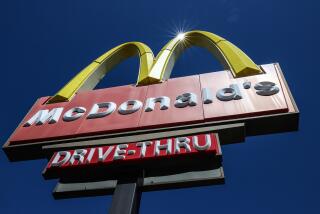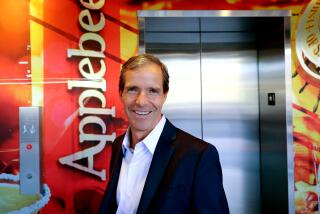Burger King and Warren Buffett under fire for Tim Hortons deal
Burger King’s $11.4-billion deal for Canadian coffee-and-doughnut chain Tim Hortons Inc. — with a new headquarters in Canada — sparked calls for a boycott and criticism of billionaire Warren Buffett, who is helping to finance the merger.
The latest in a series of corporate offshore tax-reducing moves, known as inversions, also puts the Obama administration in a difficult spot as it tries to stem the flow of U.S. companies moving to countries such as Canada with lower tax rates.
“I’ve eaten my last Whopper,” Oscar G. Echeverría of Irvine vowed Tuesday in one of dozens of negative comments about the deal on Burger King’s Facebook page.
Alejandra Aguilar, 35, of East Los Angeles said she planned to stop going to Burger King, where she eats once or twice a month.
“If that goes through, especially if it means the loss of money and jobs in the U.S., I would definitely boycott them,” said Aguilar, who works as a distributor for a beauty company. “I would, even though I love the little burgers.”
Burger King Worldwide Inc. executives said the move to create a corporate holding company in Canada was not a tax dodge. Instead, they said, it was justified because Canada would be the new company’s largest market. They noted that Burger King would remain a stand-alone brand with its headquarters still in Miami.
The outrage over another corporation moving out of the U.S. normally would fuel President Obama’s recent efforts to tighten restrictions on inversions. But the role of Obama ally Buffett, whose firm is investing $3 billion to finance the deal, muddled the message for the administration.
Buffett has been a staunch advocate of companies and citizens paying their fair share of taxes — so much so that the administration’s proposal to force millionaires to pay the same share of their income in taxes as middle-class families is known as the Buffett Rule.
But on Tuesday, Buffett was criticized as a hypocrite even though he echoed Burger King’s comments that the move was not done to avoid paying U.S. taxes.
“It has to be twisting the White House in messaging and political knots,” said Chris Krueger, a Washington policy analyst with Guggenheim Securities.
“How can you hammer a deal for tax policies when the very person your signature tax policy — the Buffett Rule — is named after is involved and argues that [the deal] is not tax-motivated?” Krueger said.
“The White House cannot paint this as a black-and-white issue, and Buffett’s involvement shows that it is more like 50 shades of gray,” he said.
Burger King’s purchase of Tim Hortons, creating the world’s third-largest fast-food company, is one of the highest-profile tax inversions so far.
In such a maneuver, which is legal, a U.S. company buys a foreign competitor in a nation with a lower corporate tax rate and shifts its headquarters to that country. As inversions have gained in popularity in recent years, the Obama administration and some congressional Democrats have been pushing for new restrictions.
Even so, proposed curbs probably wouldn’t apply to the Burger King-Tim Hortons deal. A House bill has an exception when a company has “substantial business activities,” such as 25% of its employees or assets, in the country where it plans to place its headquarters.
Burger King Executive Chairman Alex Behring, who would hold the same role for the combined company, insisted that the deal was “not driven by tax rates.”
Burger King, which is controlled by Brazilian investment firm 3G Capital, saw an opportunity to expand Tim Hortons globally, he said.
The headquarters for the new firm will be in Canada, which would be its “natural home,” Behring said. Two-thirds of the new company’s revenue will come from Canada, with 20% from the U.S. and 13% from the rest of the world.
The combined federal, provincial and local corporate tax rate in Canada is 26.3%, according to the Organisation for Economic Cooperation and Development. The combined U.S. corporate rate is 39.1%.
Burger King’s overall effective tax rate last year was 27.5%, according to its annual report. Tim Hortons’ effective tax rate for the same year was 26.8%.
“We don’t expect there to be meaningful tax savings, nor do we expect there to be a meaningful change in our tax rate,” Burger King Chief Executive Daniel Schwartz told reporters.
Buffett said it made sense for the combined company’s headquarters to be in Canada. The companies are roughly equal in market value, and Tim Hortons had sales of $3.2 billion last year, compared with $1.1 billion for Burger King.
“Tim Hortons earns more money than Burger King does,” Buffett told the Financial Times. “I just don’t know how the Canadians would feel about Tim Hortons moving to Florida. The main thing here is to make the Canadians happy.”
Tim Hortons is an iconic Canadian brand, and regulators there might not allow a purchase if the headquarters would be outside the country, said Robert Willens, a tax professor at Columbia Business School.
“Normally with an inversion, you wouldn’t be inverting to Canada. That’s not exactly a tax haven,” he said. “So I definitely got that impression that in order to pass muster under the review process ... the holding company had to be incorporated and resident in Canada.”
But Marvin G. Ryder, an assistant professor of marketing and entrepreneurship at McMaster University in Ontario, said Canada’s conservative government probably would approve the deal even if the corporate headquarters were in the U.S.
Canadians have taken news of the fast-food deal better than Americans, he said.
“There’s the initial shock value of here’s another Canadian company being purchased,” Ryder said. “But it’s being purchased by an American company that wants to become a Canadian company, so it’s not so bad.”
Under the deal, 3G Capital, which owns 70% of Burger King, would own 51% of the holding company, and shareholders of both firms would hold the rest. Tim Hortons shareholders can opt for cash and stock, all cash or all stock.
The combined company would have more than 18,000 restaurants in 100 countries and about $4.3 billion in annual sales.
Some advocacy groups are already organizing boycotts and petition drives against Burger King. Sen. Sherrod Brown (D-Ohio) urged people to buy their burgers elsewhere because of “Burger King’s decision to abandon the United States.”
Roger Hickey, co-director of Campaign for America’s Future, a progressive group advocating for economic issues, launched a petition titled “A Whopper of a Scam.”
“They are seen rightly as unpatriotic and turncoats,” he said of Burger King. “People have a lot of choices. Burger King is going to feel the pressure from U.S. consumers, from politicians, from activist citizen groups.”
Americans for Tax Fairness, an umbrella group for other organizations, quickly put together an advertisement featuring Burger King’s mascot dressed in a black business suit and running away. The tagline: “Hey BK: You can’t have it your way.”
Industry experts said Burger King is especially vulnerable to a backlash because it is a popular consumer brand, unlike some of the pharmaceutical companies that have undertaken other recent high-profile inversions.
But Kevin Scott, co-founder of branding consultancy ADDO Worldwide, predicted that customer outrage won’t have a big effect on Burger King’s bottom line. Many customers who eat at fast-food chains prioritize speed and food quality over political considerations.
“They are going to have a backlash that is loud, but will be short-lived,” Scott said. “Most people will not be thinking about their patriotism when they are pulling through the drive-through at Burger King.”
Times staff writer Andrea Chang contributed to this report.








